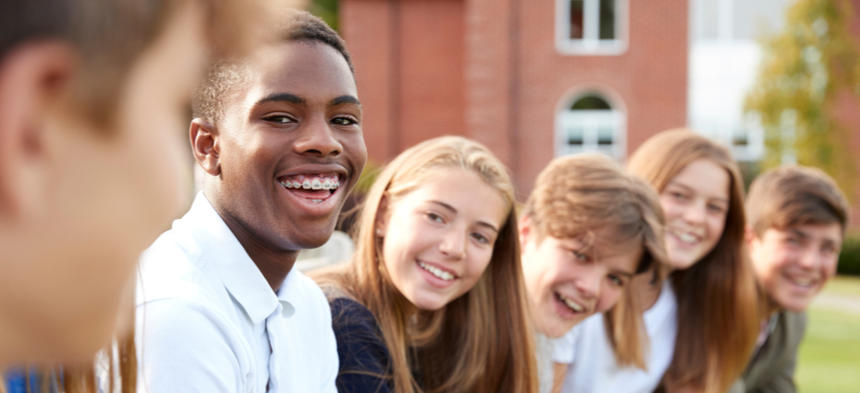Raising Food Allergy Awareness
Written by the Teen Advisory Group (TAG)

On the plane ride home [from the FARE Summit], I felt inspired-but to do what? Before the 2018 Summit, the only food allergy community I knew was made up of myself, my mom, and my allergist. At school, I only knew two or three other people with food allergies and it wasn’t something that we had deep, extensive conversations about. Instead, I learned of their allergies as an afterthought or through a random observation. I felt that it would not only be beneficial for myself, but for my friends and classmates, if there was a space where we could talk about our allergies: a space to ask questions, get advice, and simply share our experiences. And then I decided to start a club.
At my school, you have to apply to start a club at the beginning of the year, so I spent the next couple of months planning. About two months after the 2018 Summit, I applied to be a part of FARE’s Teen Advisory Group and began to participate in a project involving the accessibility of safe food for food-insecure individuals with food allergies. At the beginning of my junior year, I assembled a board and asked a former teacher to be our club advisor, and we got approved by my school’s leadership. In the past year, Teal Teens has participated in the Teal Pumpkin Project, hosted speaker events, and organized a food allergy-friendly food drive in cooperation with the TAG project I took part in.
If you are interested in raising food allergy awareness, a great opportunity is to start your own food allergy club. I know that the idea can seem intimidating, but here are two pieces of advice that I’ve learned through my experience:
- Don’t feel constrained to just people with food allergies.
- When you’re starting a food allergy club, you may feel that the only people who would benefit are people with food allergies. This isn’t true-people who don’t have allergies can still advocate for those who do, and they can help spread understanding. My advisor and vice president don’t have food allergies, but they have been incredibly supportive and helpful nonetheless.
- Appeal to people’s existing interests and goals with opportunities such as volunteer experience and speaker presentations.
- When you are initially starting out with your club, you may feel that no one is interested in joining. Food allergies can seem a little niche to those who don’t have them, but you can increase interest by presenting people with opportunities they can benefit from. With Teal Teens, we focused on advertising to students in the biomed pathway by organizing speaker events with a local allergist and the CEO and co-founder of the company Nima. We also appealed to the need many students have for volunteer hours and provided these hours with our Teal Pumpkin Project painting and food drive.
-Celeste Virador
Last summer I held my “Protect A Life Dance Marathon” and was working on a 2020 one, but obviously, with COVID-19 it won’t be possible this summer. Before even sending out the posters I felt very insecure about sharing my experiences and doing a presentation for Food Allergy Awareness Week at my school. I was able to bring my entire school together and tell them my story with food allergies. I have been raising awareness for food allergies ever since I was little. My dad was on the committee in our town and there were walks every year.
-Diya Chabria
- Raise money for FARE by holding a fundraiser such as a movie night, car wash, craft sale, charity concert etc. Make signs so people know where the money is going. Also, rather than charging admission or charging per craft, I have found it helpful to say “any donation is welcome,” so people are able to donate an amount they choose.
- Also, you can get your community involved in helping by making posters, sending invitations, or posting on social media.
-Teresa Hooker
One way you can raise awareness is by holding a fun run fundraiser. This is not only exciting and healthy, but it can give you a good amount of money to start off with.
-Kaia Patel

I love making bracelets, ever since I learned in summer camp when I was 5. I love making them for friends and family.
In March, I realized that Food Allergy Awareness Week was coming up in May, and I wanted to make a bracelet so I could still be wearing teal when I ran out of teal clothing. I tend to procrastinate so I thought I better start early.
I had made a bracelet for myself when I realized I could make some for my friends so they could sear teal all week instead of just one day like what usually happens. When quarantine hit, I suddenly had so much more time on my hands, so I thought, "What if I make this a short-term non-profit? I could raise money and awareness." I went to my mom for her thoughts and she loved it.
I assembled a team of my friends to help me get the project going. Annabel Groseclose and Oliva Lee Learch helped make the bracelets. Without them, I would have been swamped with the work. Caroline Firehock and Sydney Ciota helped create our Instagram page. Sydney Ciota, Sydney Wildermuth, and Abby Bundy, helped with website design. Without them, I never would've been able to pull this off.
We raised $250 to donate to FARE for research and education.
-Ella Singer
- Compile a presentation about food allergies to share in a school. You could include topics such as how to keep people with food allergies safe, or ways that the community can help (remember that the presentation may need to be altered, depending on the age of the students).
- Go into scout groups, library programs, or daycares and talk about how to keep people with food allergies safe. You may want to bring materials from FARE along.
-Teresa Hooker
- Represent food allergy awareness in your own social media posts (ex.: wear teal during food allergy awareness week, share FARE’s posts, let people know about the Teal Pumpkin Project etc.)
- You can help raise awareness by advocating for specific issues. It would be helpful to join FARE’s email list, so that you know when there are problems that need to be addressed. One example would be the recent FDA labeling changes.
-Teresa Hooker
- TAG is FARE’s Teen Advisory Group. We work on/lead projects together each year and help to raise food allergy awareness in our communities and nationwide. You can check FARE’s website and apply next year.
- This is a helpful way to raise awareness, since you will make connections with other teens around the nation who will be willing to help you and are excited to listen to your ideas!
- Teresa Hooker
This is my first year being part of TAG, and it is one of the greatest experiences for people with allergies! I am really enjoying being a part of TAG. You get to work on projects that help raise awareness for food allergies with other people. Once you are part of TAG, you can become a project leader for a topic you are advocating for.
-Kaia Patel
Getting involved in raising awareness for food allergies can seem challenging. I’m sure many people reading this post have felt excluded or have been teased due to their allergies, and the idea of raising awareness for them feels like sticking your neck out for something that hasn’t been that nice for you.
I know that I felt everything listed above when I started my food allergy awareness and support club, Teal Teens, this past fall. I had gone to my first FARE Teen Summit a year before, in 2018, and I am not exaggerating when I say it changed my life. That conference was the first time that I had been in a room almost exclusively filled with people with food allergies, and I felt seen in a way that I never felt before. I made friends that I’m still close with, and I learned so much by talking with presenters who understood and shared my experiences.
-Celeste Virador
I had gone to my first FARE Teen Summit a year before, in 2018, and I would have to agree with Celeste, it also changed my life. That conference was the first time that I had been in a room almost exclusively filled with people with food allergies, and I felt seen in a way that I never felt before. I made so many friends. One of my favorite memories from my first conference was meeting so many people and sitting on the rooftop with my friends. After attending the conference I applied to be a TAG member. During the 2019 conference, I got to present twice. One on dealing with switching schools, bullying, and navigating situations in schools. The second on my Protect A Life Dance Marathon in which I raised money for those who couldn’t afford EpiPens. I am continuing this project and you can go to the website to check it out. With that during food allergy awareness week, I told students if they wanted to dress down in teal to pay $5. Raising awareness can be that simple.
-Diya Chabria
You get to meet lots of kids your age who have the same challenges that we face everyday. If you are interested in attending, you can even apply to be a speaker at the event!
-Kaia Patel
Another way you can advocate is just by talking to your teachers and friends about how to use an autoinjector and how allergies can affect your day to day life. This may sound simple, but it provides people with needed information.
-Kaia Patel
You do not need to do a big event. Even if you are advocating for yourself and others, it is raising awareness.
-Diya Chabria
Quotes About Raising Awareness
The great thing about advocating for food allergy awareness is that there are so many different ways to go about it-whether you join FARE’s Teen Advisory Group, organize community events, or even start your own food allergy club, you are making a difference for yourself and for others like you. I hope these tips are helpful!
-Celeste Virador
You do not need to do a big event. Even if you are advocating for yourself and others, it is raising awareness.
-Diya Chabria
Getting involved with raising food allergy awareness can be fun and rewarding, plus there are many different ways to get involved! Once you come up with a way you enjoy, you can help spread food allergy awareness in your community! I hope that you found this list helpful and that you are able to get involved and start (or continue) to raise food allergy awareness!
-Teresa Hooker
Advocating is an important way to help raise awareness about food allergies. Not only does advocating for allergies spread awareness, it helps boost your confidence, self esteem, and social skills. Even though people with food allergies face challenges everyday in their lives, there are still ways to get your voice heard through raising awareness for allergies. I hope these ways of advocating are helpful!
-Kaia Patel

Teen Advisory Group
FARE's Teen Advisory Group (TAG) is our voice for the teen and young adult food allergy community.


